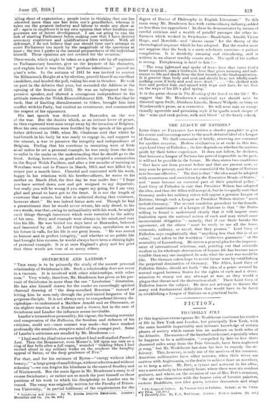SWINBURNE AND LAXDOR.*
" TAN essay is to be primarily the study of the master personal relationship of Swinburne's life. Such a relationship does not occur in a vacuum. It is involved with other relationships, with other men." Very wisely, therefore, Mr. Henderson has given us his por- trait of Swinburne in more than the one " Landorian " dimension. He has also himself drawn for the reader an exceedingly spirited charcoal drawing of " the deep-mouthed Boeotian " instead of letting him be seen only through the jewel-tinted lorgnette of his gorgeous disciple. It is not always easy to comprehend literary die- cipleships—to understand a Matthew Arnold and an Obermann, or the slighter reaction of a Dunbar and a Gower, but in the case of Swinburne and Lander the influence seems inevitable.
Landor's tremendous personality, his vigour, the burning restraint and compression of the Hellenics, the freedom and richness of his criticism, could not—once contact was made—but have marked profoundly the sensitive, receptive mind of the younger poet. Some of Landor's criticisms are recalled by Mr. Henderson :- " I had read the Iliad twice over before I had well studied Paradise Lost. Then the Hexameter, even Homer's, fell upon my ears as a ring of fine bells after a full organ," sounded " tinkling when I had recited aloud in my solitary walks on the seashore the haughty appeal of Satan, or the deep penitence of Eve."
For that, and for his estimate of Byron—" energy without ideal beauty," "a large grasp of small things, without selection and without eohesion"—we can forgive his blindness in the cases of Southey and of Wordsworth. But the main figure in Mr. Henderson's essay is of course Swinburne ; or rather not so much the poet himself as those portions of his work to which his discipleship to Landor can be traced. The essay was originally written for the Faculty of Prince- ton University, " in partial fulfilment of the requirements for the
• Sariabarne and Lander. By W. Brooks Drayton Henderson. London : Macmillan and Co. [Se. Gd. net.) degree of Doctor of Philosophy in English Literature." To this main essay Mr. Henderson has, with extraordinary industry, added no less than ten appendices ! In these he demonstrates by means of careful criticism and a wealth of parallel passages the other in- fluences which worked in Swinburne—Baudelaire, Arnold, Victor Hugo, and Meredith—and "shows cause" for the theory of the chronological sequence which he has adopted. But the reader Inust, not suppose that the book is a mere scholastic exercise—a patient compilation. It is decidedly amusing and stimulating, and is written in an almost terribly ornate style. The spell of his author is strong. Paraphrasing is fatal to him !- " The song lightened and spoke of love—love that turns God's heart manward, mart's Godward, love that gives. meaning and sub- stance to life and death from the first. breath to the final suspiration. It is greater than body and soul, and should live; not whollymade nothing even if body and soul were dead." . . . -So, clothed with love and perfect fear, and armed with hope and hate, he set foot on the ways of his life's glad spring."
It is the great chorus in The Hunting of the Snark to the life ! We suggest that Mr. Henderson's analytical eye should next be directed upon Swift, Abraham Lincoln, HUrace Walpole, or Gray or Wordsworth's prose, as a corrective. He will soon ruin an excep- tionally agreeable and promising style if he quaffs much deeper of the " wine and rank poison, milk and blood " of the heady schooL


























 Previous page
Previous page